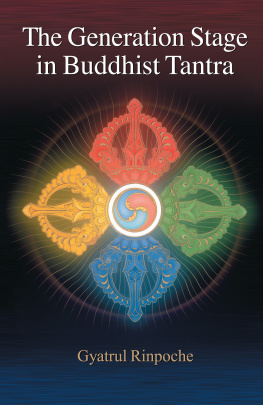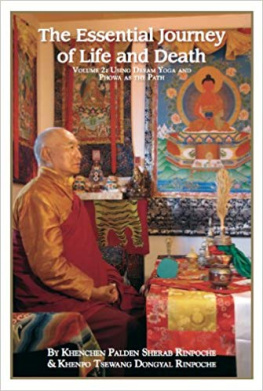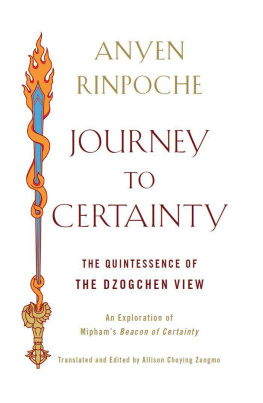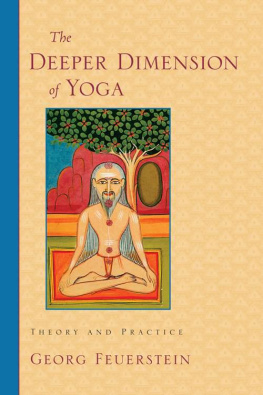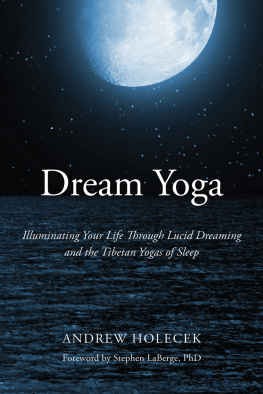
Meditation,
Transformation,
and Dream Yoga
Meditation,
Transformation,
and Dream Yoga
by Ven. Gyatrul RinpocheTranslations by Sangye Khandro and B. Alan Wallace





Contents
................................................................... 7
Introduction
If we were to consider condensing all Dharma practices and required daily commitments into the most essential practices necessary to accomplish realization in this immediate lifetime, we must then consider our own time and how it is spent. A slot of time is usually dedicated to a daily practice or routine of formal practice. Most of the daytime is spent involved in various activities with family, friends and in the job place. Finally there is the time that we spend sleeping and dreaming during the night. It is with these three time periods in mind that the three texts were chosen for this book. Each of these three texts and their commentaries give the methods and practical instructions that are applicable to these times so that our goal of liberation in this very life can be achieved.
First, Transforming Felicity and Adversity into the Spiritual Path by Jigme Tenpe Nyima was selected as the contemporary classic for improving the quality of daily life experiences and teaching the precise methods through which extremes can be brought to the path. This new English translation by B. Alan Wallace is illuminating and superb.
The second selection, Releasing Oneself from Essential Delusion by Lochen Dharma Shri, is one of the most direct and useful dream yoga accomplishment manuals available. Translated from the original Tibetan by B. Alan Wallace, it is as clear as it is precise. The commentary to it presented here was taught by Gyatrul Rinpoche during the summer of 1990 in Ashland, Oregon.
The third selection, The Illumination of Primordial Wisdom by H.H. Dudjom Rinpoche, again is one of the most simple, direct and useful manuals on ascertaining the view, meditation and conduct through the Great Perfection practices of quiescence and insight (samatha and vipassana). This teaching is meant to be accomplished in formal sitting sessions and carried into daily life experience.
Even if we are successful in our formal practice and lucid dream awareness, if our daily life experiences are still the cause of hope and fear - thus increasing our excitement and disappointment - then the goal of liberation in this life is impaired. This little key to the transformation of all highs and lows into true spiritual awareness is truly indispensable.
The commentary to this text was given by Gyatrul Rinpoche to the Vajradhatu community at Boulder, Colorado in the fall of 1991. Hours before the teaching was scheduled to begin, we received the sad news of the parinirvana of H.H. Dilgo Khyentse Rinpoche in Thimphu, Bhutan. The impact of this news, combined with the subject material, was yet another miraculous display of the guru's kindness.
I would like to thank B. Alan Wallace for the excellent translation he has made of the three root texts. In the twenty years that we have known one another as dharma friends, Alan has always been a source of knowledge and an inspiration, as well as a good friend.
I would also like to thank Kay Henry for all the effort she has put into the preparation of this manuscript. Her enthusiasm to work hard for the Dharma is a source of joy.
- Sangye Khandro Tashi Choling August, 1992
PART I
TRANSFORMATION
Transforming Felicity and Adversity
into the Spiritual Path
by Jigme Tenpe Nyima, The Third Dodrupchen RinpocheTranslated by B. Alan WallaceCommentary by Venerable Gyatrul RinpocheTranslated by Sangye Khandro
Part 1 The Root Text
by Jigme Tenpe Nyima,
The Third Dodrupchen Rinpoche
Transforming Felicity and Adversity into the Spiritual Path
Homage:
Oh, Noble Avalokiteshvara, Who always rejoices at the happiness of others, Who is deeply saddened by others' suffering, Who has perfectly realized the qualities of great compassion, And who has released his own joy and sorrow...
I bow to you recalling your virtues; and I shall explain in part the quintessential teaching on transforming felicity and adversity into the spiritual path, this being an indispensable tool of spiritually realized beings, which is invaluable in the world.
HOW TO TRANSFORM ADVERSITY INTO THE SPIRITUAL PATH BY MEANS OF RELATIVE TRUTH
Whenever you are afflicted by sentient beings or anything else, if you habituate your mind to dwelling on suffering only, even the most insignificant circumstance will bring forth great distress. This is because whatever attitude you cultivate towards felicity and adversity will, by nature, grow stronger. Thus, as the power of gradual habituation increases, eventually virtually everything that appears will lead to misery, and there will be no possibility of happiness.
By not recognizing that this is due to your own mental habits, you blame this on external circumstances, and eventually the flames of hatred, evil actions, suffering and so on spread endlessly. Thus, appearances arise as enemies. The reason why sentient beings of this corrupt era are afflicted by suffering stems from our interior powers of discrimination; so this calls for precise understanding.
Therefore, the meaning of not being afflicted by the hindrances of enemies, sickness, malevolent spirits, and so on is not that one averts the arising of illness, etc. or prevents their occurrence in the future. Rather, it means that these things are not able to arise as obstacles to following the spiritual path.
In order for this to happen, you must (1) dispense with the attitude of utter aversion to adversity and (2) develop the attitude of good cheer in the face of adversity.
Dispensing with the Attitude of Utter Aversion to Adversity
Recognize again and again the pointlessness and great detriment of all the miserable anxiety you experience through regarding adversity as being purely unfavorable. And thoroughly accustom yourself to the powerful anticipation, "From now on, whatever kind of adversity arises, I shall not quail." In this way practice cultivating great courage.
The pointlessness of aversion to adversity. If adversity can be corrected, there is no need to be despondent; and, if it cannot be remedied, there is no benefit even if one becomes unhappy.
The great detriment of such aversion. If you do not react with anxiety, due to the strength of your mind, it will be easy to experience and handle even great adversity as if it were as light and flimsy as cotton wool. On the other hand, if you react with anxiety, you will become unbearably oppressed with overwhelming misery in the face of even minor adversity.
For example, while thinking about a gorgeous woman (or man), even if you try to stop desire, you just wear yourself out. Likewise, by engrossing yourself in the miserable aspects of some adverse situation, you will be unable to develop any sense of fortitude. Thus, as in the instructions on guarding the doors of the senses, in the event of adversity you should not become engrossed in its characteristics; rather, get used to placing your mind in its natural state and let it apprehend its own nature.
Next page

